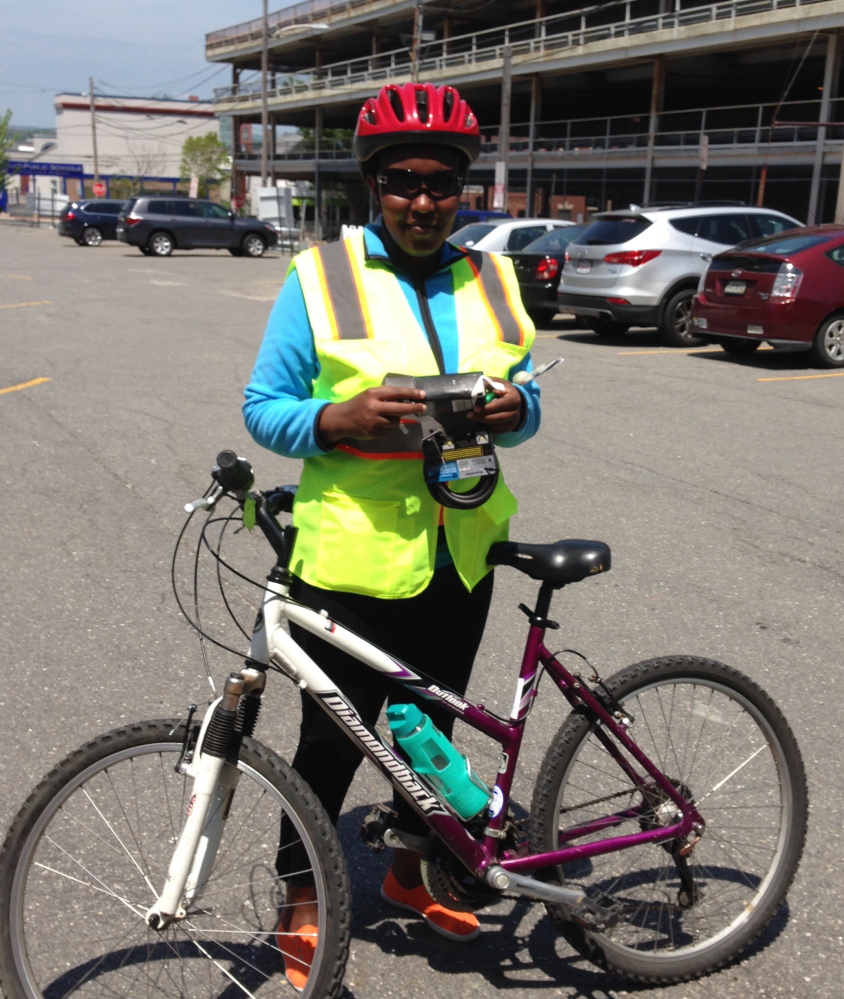Eugenie Mydear learned to ride a bicycle with no gears or brakes in a Ugandan refugee camp. Her family didn’t have a car, so they hauled water and groceries on the bike. They’d blast the horn to let people know they were coming.
“We learned how to use our feet” to slow down, says Mydear, who still has a scar from a childhood bike crash.
Since moving to Portland a year ago, Mydear and her three young children have been getting around by foot or bus. But she now has a purple and white mountain bike of her own – with gears and working brakes – thanks to the Bikes for New Mainers program.
Mydear was one of nine adult immigrants who participated in the program last weekend. They learned how to bicycle safely, then practiced riding around Portland. At the end of the nine-hour course, each received a used bicycle, helmet, lights, bell, lock and a gift certificate for bike repairs.
The Bicycle Coalition of Maine worked with Hope House, Catholic Charities’ Refugee and Immigration Services and several cycling organizations to start the program last year.
Nancy Grant, the coalition’s executive director, said many new immigrants “don’t have driver’s licenses, don’t have motor vehicles and are asked to go all over town to complete paperwork, to attend different kinds of orientations, to sign up for English classes and to take them.”
“If they had bicycles,” she said, “it would make life a lot easier.”
The coalition had bicycles left over from its Portland bike swap, and its members donated more bikes. Recycle-a-bike programs in Biddeford and Westbrook also gave bicycles. The Community Cycling Club of Portland provided bike locks.
The class has been offered three times and demand is strong. More than 60 people applied for the May class.
The students came from Iraq, Rwanda, the Democratic Republic of Congo, Burundi, Angola and Uganda. Most had previously biked in very different circumstances. The African students said that in their native lands no laws protect cyclists and no one wears a helmet.
Mydear said that in Uganda and Rwanda it is not accepted for girls and women to ride bicycles. She used to sneak rides on her brothers’ bikes. As she got older, though, she feared she would damage her reputation, since women who on bikes are assumed to be prostitutes.
Coco Kazadi used to ride a bicycle on his uncle’s Congolese farm. There, bicycles serve the same purpose that pickup trucks do in the United States. Kazadi said his uncle depended on the bike to transport beans, maize and peanuts to market.
The Bikes for New Mainers class met for three sessions. Nathan Hagelin, the main teacher, arranged for use of a conference room at the Portland consulting firm where he works as a hydrogeologist. He also is a League Cycling Instructor, a nationally recognized credential for bicycle educators.
Hagelin taught students how to fit their helmets snugly. He showed them how to position themselves in traffic as they approach intersections. He encouraged them to be courteous to pedestrians.
After an hour in the classroom, the students were eager to try out their skills. Hagelin passed out orange and green safety vests, assuring students that they were very fashionable. “Don’t give me that face!” he teased.
The students learned how to pump up their tires. Then, Hagelin led them on a ride around the Portland peninsula. They followed trails through Bayside and past East End beach. They practiced making hand signals and changing gears. They called out to pedestrians, “On your left!”
As they approached downtown, Hagelin warned the class, “We’re going to have some cars, some hills, some traffic lights, some tight situations.”
Students rode single file, just as they’d been taught. They smiled and hooted triumphantly as they arrived back at the parking lot.
Mydear said her husband, who still lives in Uganda, considers her a “hero” for learning how to ride a bike better than he can. She plans to use the bicycle to get to classes at Portland Adult Education and, eventually, to a job. Soon, she said, “I’ll be riding all over the city.”
The Bicycle Coalition hopes to offer two more classes for immigrants this year. Grant, the executive director, would like to hire an interpreter and to translate curriculum materials. But all that depends on securing donations to cover costs and on rounding up more bicycles.
You can help. If you have an unused bike in decent condition that’s taking up space in your garage, consider donating it to the Bikes for New Mainers program. You can find out more by emailing info@bikemaine.org.
Shoshana Hoose is a freelance writer who bicycles in Greater Portland and beyond. Contact her at shoshanahoose@gmail.com.
Send questions/comments to the editors.


